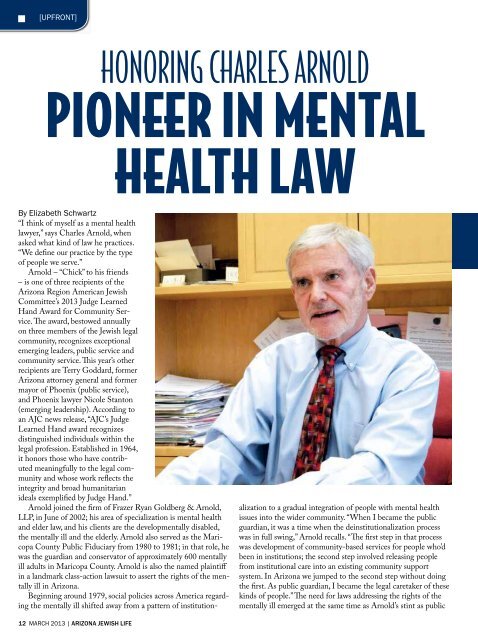AZJL_Mar13
AZJL_Mar13
AZJL_Mar13
Create successful ePaper yourself
Turn your PDF publications into a flip-book with our unique Google optimized e-Paper software.
[UPFRONT]<br />
HONORING CHARLES ARNOLD<br />
PIONEER IN MENTAL<br />
HEALTH LAW<br />
By Elizabeth Schwartz<br />
“I think of myself as a mental health<br />
lawyer,” says Charles Arnold, when<br />
asked what kind of law he practices.<br />
“We dene our practice by the type<br />
of people we serve.”<br />
Arnold – “Chick” to his friends<br />
– is one of three recipients of the<br />
Arizona Region American Jewish<br />
Committee’s 2013 Judge Learned<br />
Hand Award for Community Service.<br />
e award, bestowed annually<br />
on three members of the Jewish legal<br />
community, recognizes exceptional<br />
emerging leaders, public service and<br />
community service. is year’s other<br />
recipients are Terry Goddard, former<br />
Arizona attorney general and former<br />
mayor of Phoenix (public service),<br />
and Phoenix lawyer Nicole Stanton<br />
(emerging leadership). According to<br />
an AJC news release, “AJC’s Judge<br />
Learned Hand award recognizes<br />
distinguished individuals within the<br />
legal profession. Established in 1964,<br />
it honors those who have contributed<br />
meaningfully to the legal community<br />
and whose work reects the<br />
integrity and broad humanitarian<br />
ideals exemplied by Judge Hand.”<br />
Arnold joined the rm of Frazer Ryan Goldberg & Arnold,<br />
LLP, in June of 2002; his area of specialization is mental health<br />
and elder law, and his clients are the developmentally disabled,<br />
the mentally ill and the elderly. Arnold also served as the Maricopa<br />
County Public Fiduciary from 1980 to 1981; in that role, he<br />
was the guardian and conservator of approximately 600 mentally<br />
ill adults in Maricopa County. Arnold is also the named plainti<br />
in a landmark class-action lawsuit to assert the rights of the mentally<br />
ill in Arizona.<br />
Beginning around 1979, social policies across America regarding<br />
the mentally ill shifted away from a pattern of institution-<br />
12 MARCH 2013 | ARIZONA JEWISH LIFE<br />
alization to a gradual integration of people with mental health<br />
issues into the wider community. “When I became the public<br />
guardian, it was a time when the deinstitutionalization process<br />
was in full swing,” Arnold recalls. “e rst step in that process<br />
was development of community-based services for people who’d<br />
been in institutions; the second step involved releasing people<br />
from institutional care into an existing community support<br />
system. In Arizona we jumped to the second step without doing<br />
the rst. As public guardian, I became the legal caretaker of these<br />
kinds of people.” e need for laws addressing the rights of the<br />
mentally ill emerged at the same time as Arnold’s stint as public


